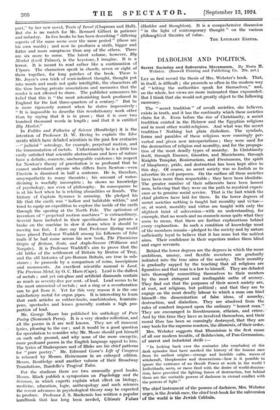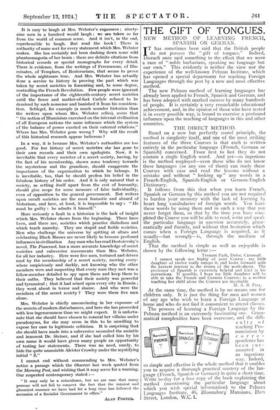DIABOLISM AND POLITICS.
LET us first record the thesis of Mrs. Webster's book. That, in itself, is difficult ; she proceeds so often in the modern way of " letting the authorities speak for themselves," and, on the whole, her views are more insinuated than expounded. But T think that she would not greatly object to the following summary.
The " secret tradition " of occult societies, she believes, exists in truth, and it has the continuity which these societies claim for it. Even before the rise of Christianity, a secret tradition existed in the Hebrew and the Egyptian religions and in most other world-religions. And what was the secret
tradition ? Nothing but plain diabolism. The symbols, forms and parables of these religions were cunningly per- verted and- given new interpretations ; they were used for the destruction of religion and morality, and for the propaga- tion of the most deadly types of anarchy. In Christianity itself, through Essenes, Gnostics, and Manicheans, .through Knights Templar, Rosicrucians, and Freemasons, the spirit of blasphemy, pride, and destruction has been kept alive to this day. Of course, no secret society was so foolish as to advertise its evil purposes. On the surface all these societies have been more than respectable ; they have been idealistic. The greater number of their adherents have been honest men, believing that they were on the path to mystical experi- ence or to genuine social service. That is the bait which the chief plotters have laid for them. In the lower degrees of secret societies nothing is taught but morality and virtue— or, at worst, morality and -virtue are taught with only the slightest taint of subversion—with an understanding, for example, that no words and no counsels mean quite what they seem to mean, that there are further explanations behind every explanation. In such a condition of knowledge most of the members remain--pledged to the society and by nature sufficiently loyal to believe that it has none but the noblest aims. Their confidence in their superiors makes them blind and eager servants.
Behind the lower degrees are the degrees in which the more ambitious, uneasy, and flexible members are gradually initiated into the true aims of the society. Their morality is gradually sapped by the teaching that all religions are figurative and that man is a law to himself. They are deluded into thoroughly committing themselves to their mentors by the most stringent and irrefragable oaths of secrecy. They fmd out that the purposes of their secret society are, at root, not religious, but political ; and that they are to engage on the most deadly labour to which a man can bind' himself—the dissemination of false ideas, of anarchy,'" destruction, and diabolism. They are absolved from the rules of conduct imposed upon the ordinary " honest man." They are encouraged in licentiousness, atheism, and crime. And by this time they have so involved themselves, and their moral fibre has been so cunningly destroyed, that they are easy tools for the supreme masters, the illurninis, of their order.
Mrs. Webster suggests that Illuminism is the first cause of all our modern trouble, of Bolshevism, of Pan-Germanism, of unrest and industrial strife :—
" In looking back over the centuries (she concludes) at the dark episodes that have marked the history of the human race from its earliest origins—strange and horrible cults, waves of witchcraft, blasphemies and desecrations—how is it possible to ignore the existence of an Occult Power at work in the world Individuals, sects, or races fired with the desire of world-domina- tion, have provided the fighting forces of destruction, but behind them are the veritable powers of darkness in eternal conflict with the powers of light."
The chief instrument of the powers of darkness, Mrs. Webster urges, is the Jewish race, the chief text-book for the subversion of the world is the Jewish Cabbala.
It is easy to laugh at Mrs. Webster's -exposures ; ninety- nine men in a hundred would laugh ; we -are taken so far from the world of common sense. And it isn't, in the end, reprehensible to laugh. But read the book 1 There is authority of some sort for every statement which Mrs. Webster makes. She has certainly not been dashing down some wild phantasmagoria of her brain : there are definite citations from historical records or special monographs for every detail. There is evidence, from the writings of Freemasons, of Illu- minates, of Templars, of Rosicrucians, that seems to prove the whole nightmare true. And Mrs. Webster has actually done a service to history in proving the part which was taken by secret societies in fomenting and, to some- degree, controlling the French Revolution. Few people wereignorant of the importance of the eighteenth-century secret societies until the fierce and matter-of-fact Carlyle refused to be deceived by such nonsense and banished it from his considera- tion. Schlegel, for example (a much sounder historian than the writers upon whom Mrs. Webster relies), avers that " the notion of Illuminism exercised on the internal civilization of all European nations the same influence which the system of the balance of power exerted on their external relations." Where has Mrs. Webster gone wrong ? Why will the result of this historical research appear ludicrous ?
In a way, it is because Mrs. Webster's authorities are too good. For her history of secret societies she has gone to their own records and their own apologists. Now, it is inevitable that every member of a secret society, having, by the fact of his membership, shown some tendency towards the mysterious and the grandiose, should exaggerate the importance of the organization to which he belongs. It is inevitable, too, that he should profess his belief in the fabulous history of his order. And it is only natural that a society, so setting itself apart from the rest of humanity, should give scope for some measure of false individuality, even of opposition to the general government. But writers upon occult societies are the most fantastic and absurd of historians, and here, at least, it is impossible to say : " He must be guilty : he admits it himself."
More seriously a fault in a historian is the lack of insight which Mrs. Webster shows from the beginning. There have been, and there are, societies which practise diabolism and which teach anarchy. They are stupid and feeble societies. Men who challenge the universe by spitting at altars and celebrating Black Masses are never likely to become profound influences in civilization Any man who has read Dostoievsky's novel, The Possessed, has a more accurate knowledge of secret societies and subversive movements than Mrs. Webster, for all her industry. Here were five men, tortured and driven mad by the membership of a secret society, moving every- where suspiciously and darkly, not knowing who the other members were and suspecting that every man they met was a fellow-member detailed to spy upon them and keep them to their oaths. They believed that their society was powerful and tyrannical ; that it had seized upon every city in Russia ; they went about in terror and shame. And who were the members of the secret society ? They were these five men alone.
Mrs. Webster is chiefly unconvincing in her exposure of the secrets of modern disturbances, and here she has proceeded with less ingenuousness than we might expect. It is unfortu- nate that she should have chosen to conceal her villains under pseudonyms, for she may seem in this to be unwilling to expose her case to legitimate criticism. It is surprising that she should have made into a subversive scoundrel the amiable and innocent Dr. Steiner, and if she had called him by his own name it would have given many people an opportunity of testing her statements. There was no need, surely, to hide the quite unamiable Aleister Crowley under the mystifying initial " Z."
I cannot end without commending to Mrs. Webster's notice a passage which the Observer last week quoted from the Morning Post, and wishing that it may serve for a warning. Our respected contemporary stated :--
" It may only be a coincidence, but we are sure that many persons will not fail to connect the fact that tho rainiest and gloomiest summer we have had for a long time has followed tho accession of a Socialist Government to office."
ALAN PORTER,



































 Previous page
Previous page